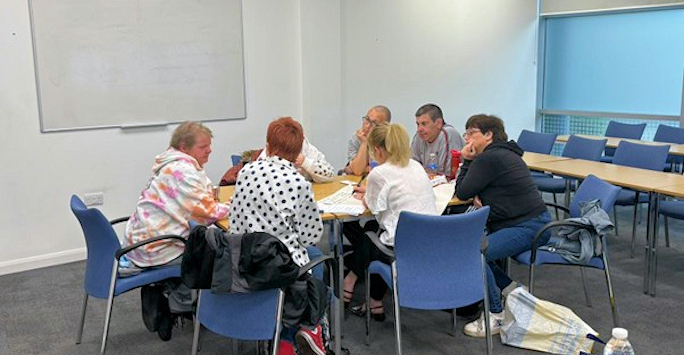
Helen Marshall is a Lecturer in Nursing from the School of Allied Health Professions and Nursing. Here she tells us about a workshop that focused on the care adults with learning disabilities receive within the community.
On Monday 3 June, the School of Allied Health Professions and Nursing held a patient and public involvement and engagement (PPIE) event that explored three different populations views with lived experience on the same topic – the care which an adult receives in the community setting. The workshop was funded by the Institute’s Research and Scholarship budget and facilitated by myself, Dr Carolyn Lees, Dr Florence Mgawadere and Janet Williams.
The challenge
The NHS Long Term Plan aims to improve the care that people with a learning disability receive by supporting those with complex needs to stay at home. It also recognises that the level of knowledge and understanding of healthcare staff must improve to support this vision. This is alongside the introduction of mandatory training for all health and social care staff regarding learning disability and/or autism.
It is estimated that there are 100 million contacts with community services per year. This can include community nurses, district nurses and allied health professionals. With around 1.5 million people with a learning disability in the UK, it is very likely that community services will care for these patients at some stage. People with a learning disability face greater health inequality and mortality than the general population. Given the worrying reduction in learning disability nurses and those training to become one, it is important that adult nurses working in the community are appropriately skilled to care for these patients.
Engaging those with lived experience
Five adults with a learning disability attended the event with a support worker from a local Merseyside organisation, as well as six carers (two family carers and four carers in a paid role) and three community nurses. We wanted to gain their views on a proposed topic – exploring the care which an adult with a learning disability receives in the community setting from the viewpoint of all those attending the workshop. We all agreed that this was a valuable piece of work. A member of the team read out different questions and asked for feedback with staff facilitating groups on different tables. As the proposed study is a mixed method one, questions were posed such as:
- “What factors you consider when thinking about filling in a questionnaire?”
- “How long would you be prepared to spend to complete a questionnaire?”
- “What topics YOU would want to be asked about thinking about the lived experience role which you represent today.
- Whether conversations were preferred 1-1 or face to face.
- How could their attendance at such discussions be supported.
For this event we provided a travel allowance to support people to attend and a light lunch on arrival. All members were also given a gift voucher as a thank you for their time.
Next steps
The information from this PPIE event will help to shape the methodology of a mixed method research project. This forms part of a PhD project which I am undertaking and will support an application for an NIHR fellowship. PPIE has been essential to ensure the project is worthwhile and addresses the needs of those who would directly benefit. It is vital we embed PPIE at every stage of this research, ensuring those with lived experience play a large part in this project. Positively, all attendees were asked if they would be happy to be contacted for their input at different phases of this project, so their lived experience is embedded from start to finish. As all were passionate about the topic, they were happy to be contacted in the future. I hope by working together, we can create positive change.